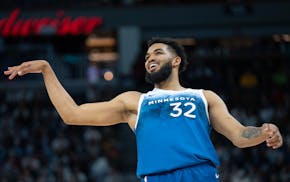Ernie Cook arrived in Minnesota late in the summer of 1968. He was a coveted recruit as a fullback from Daytona Beach, Fla. Freshmen were not yet eligible for varsity competition, so Cook anticipated moving into the Gophers lineup as a sophomore in 1969.
"No one told me about this Jim Carter," Cook said. "The first day on the practice field, I saw this giant, powerful man. I was told he was a junior named Jim Carter. I thought that he must be a tackle.
"I asked, 'What position does he play?' The answer was, 'He's a fullback.' I looked at Carter again and said, 'I guess I'll be a benchwarmer for a while.'"
On Tuesday, Carter was among those organizing a noontime gathering of former Gophers to celebrate the 98th birthday of Murray Warmath. There were players such as Bob and Pinky McNamara and Jim Soltau from Warmath's first Gophers' team in 1954, and Cook from his last in 1971.
The gentlemen from '54 were asked about their first impression of Warmath when he was hired from Mississippi State in 1954.
"There was a lot of grumbling from the older alums and fans about hiring a Southerner, but as players, we liked Murray right away," Bob McNamara said. "There was no nonsense. You could tell he was a football coach."
Soltau remembered the opening salvo in Warmath's first chalk talk.
"He took the chalk and drew a straight line down the middle of the board," Soltau said. "And then he said, 'On this side of the line is what's legal on a football field, and on that side of the line is what's illegal.'
"Then, he stared at the players and said, 'And I want you to make that line as thin as possible.'"
Cook won the long-distance award among former players Tuesday, traveling from Florida to be in attendance for the birthday lunch at Kozy's Restaurant in Edina. He was there at the urging of Carter and other teammates who previously had heard Cook talk of Warmath -- of the coach's influence on his journey from the Jim Crow South to the University of Minnesota Medical School.
On Tuesday, Cook told these fellow "Warmath Gophers" of growing up in Daytona Beach in the '50s and '60s, where road blocks were used to make dead ends of unpaved streets in the black section of town. Yards away, the streets went by a different name, and they were paved, and white folks lived there.
The famous beaches were segregated, and department stores would not allow black customers to try on clothes. And then Ernie Cook saw a more vicious side of racism, in December of 1967, when he became the first black athlete to sign for a football scholarship at Florida State.
Within a week, the hate mail started arriving "by the satchelful" at the Cook home in Daytona Beach. There were threats that young Ernie would die if he tried to play football at FSU. The hate mail also came to the elementary school where his mother, Alice Cook, was a teacher.
Ernie wanted to face down the racists and show up as planned at FSU. Then, FBI agents came to the Cook home and told the family that these were threats to take seriously. His mother begged and Ernie started making visits to other schools, including to some in the Big Ten.
"When I was young, there was one game of the week on television and it was always the Big Ten," he said. "That's where real football was played. Nothing else compared to the Big Ten.
"And as a 10-year old, in 1960, I was watching this team from Minnesota, and it had this African-American, Sanford Stephens, playing quarterback, and I couldn't believe my eyes. And there was this big, beefy bear on the sideline, and he was named Murray Warmath, and this was his quarterback."
Years later, Cook was escorted into Warmath's office on his recruiting visit. He had been to Purdue and talked football with Jack Mollenkopf and had done the same at other schools, but this coach asked Ernie what he wanted to do with his life.
Cook said he wanted to attend medical school and become a doctor.
"We talked about medicine for the rest of my time in the coach's office," he said. "And most of my recruiting visit was to the medical buildings."
Four years later, Cook was a senior and appearing as the player of the game vs. Iowa on Warmath's weekly TV show. The host asked Cook about his football future.
"Before I could answer, Coach Warmath said, 'Ernie is not going to play pro football; Ernie is going to be a doctor,' " Cook recalled Tuesday.
That's what happened. He graduated from the U of M medical school and became a family practitioner in Florida. And Tuesday, Dr. Cook had trekked to Minnesota in the dead of winter to offer his tribute and to raise a glass to the man across the room -- Murray Warmath, now 98, and still an all-important coach to Ernie and to 18 seasons of Gophers.
Patrick Reusse can be heard noon-4 weekdays on 1500ESPN. • preusse@startribune.com

Reusse: Taylor's story. 'I just bought the Minnesota Timberwolves.'

Reusse: Back from injury, Towns doesn't have to carry load


